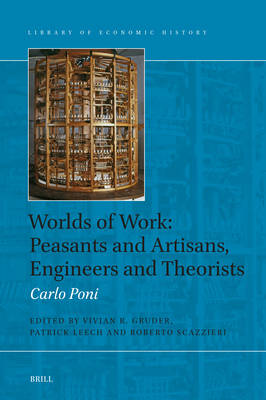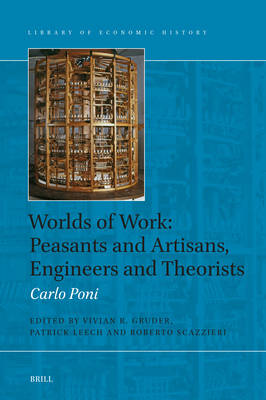
- Afhalen na 1 uur in een winkel met voorraad
- Gratis thuislevering in België vanaf € 30
- Ruim aanbod met 7 miljoen producten
- Afhalen na 1 uur in een winkel met voorraad
- Gratis thuislevering in België vanaf € 30
- Ruim aanbod met 7 miljoen producten
Zoeken
Omschrijving
The essays in this volume take the readers into the complex world of work in early modern Europe. Carlo Poni explores this theme from multiple perspectives, examining work practices in agriculture, artisan production and the silk industry. Extensive archival material, analyzed with theories derived from Economics, illuminates the social relations and conflicts that arose from different work practices in agriculture, artisan production and the silk industry.
The author presents the ideas of seventeenth- and eighteenth-century theorists: Galileo Galilei's theory of mechanics as a way to understand how machines work; the Venetian engineer Vittorio Zonca on mechanics; the natural philosopher John Theophilus Desaguliers on bodily movements; and, with an incisive critique, Denis Diderot on workers and their practices in the Encyclopédie.
Contributors are: Carlo Ginzburg, Alberto Guenzi, Steven L. Kaplan, Edmund Leites and Roberto Scazzieri.
The author presents the ideas of seventeenth- and eighteenth-century theorists: Galileo Galilei's theory of mechanics as a way to understand how machines work; the Venetian engineer Vittorio Zonca on mechanics; the natural philosopher John Theophilus Desaguliers on bodily movements; and, with an incisive critique, Denis Diderot on workers and their practices in the Encyclopédie.
Contributors are: Carlo Ginzburg, Alberto Guenzi, Steven L. Kaplan, Edmund Leites and Roberto Scazzieri.
Specificaties
Betrokkenen
- Auteur(s):
- Uitgeverij:
Inhoud
- Aantal bladzijden:
- 468
- Taal:
- Engels
- Reeks:
- Reeksnummer:
- nr. 19
Eigenschappen
- Productcode (EAN):
- 9789004294349
- Verschijningsdatum:
- 17/07/2025
- Uitvoering:
- Hardcover
- Formaat:
- Genaaid
- Afmetingen:
- 155 mm x 235 mm
- Gewicht:
- 825 g

Alleen bij Standaard Boekhandel
+ 501 punten op je klantenkaart van Standaard Boekhandel
Beoordelingen
We publiceren alleen reviews die voldoen aan de voorwaarden voor reviews. Bekijk onze voorwaarden voor reviews.








